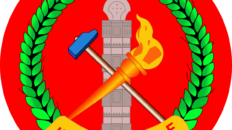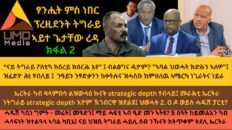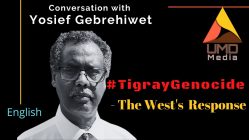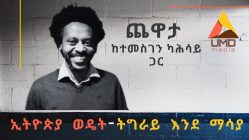UMD Media, February 4, 2025
In a letter directed at Tigrayan elites, Ethiopian Prime Minister Abiy Ahmed has called for the resolution of political differences through constitutional and democratic means. The letter, written in Tigrigna, was shared on his official social media accounts and called for a peaceful dialogue within Tigray, and between the Tigray, the federal government, and other political forces. Abiy emphasized the importance of working together to alleviate the suffering of ordinary citizens, particularly addressing the fears of the people, the distress of mothers caused by sleep deprivation, and the plight of the youth driven to migration, expressions eerily similar to those used by the Prime Minister in the pre-war months of 2020
Many Tigrayans have expressed concern that Abiy Ahmed’s message echoes rhetoric from before the devastating war declared by the federal government on Tigray that began in 2020. They noted a troubling resemblance to previous statements of the Prime Minister that painted Tigrayans as culprits of decades of conflict,and implied that the region’s elites had been complicit in these wars. For some, the Prime Minister’s words stirred memories of a time when such statements were seen as prelude to escalating tensions rather than genuine efforts for peace.
“History has a haunting way of repeating itself,” said a local Tigrayan analyst. “While Abiy’s call for resolving differences is presented as hopeful, it feels strikingly similar to previous promises that were made before the war broke out. It raises concerns that his message may be unraveling the deep-rooted trauma experienced by the people of Tigray, focusing more on appearing a man of peace than on addressing the real consequences of the war.”
Furthermore, there has been increasing avoidance of accountability, not only by the federal leadership but also by the Tigray People’s Liberation Front (TPLF) leadership. Many agree that accountability is crucial for moving forward, there is a growing emphasis on differentiating between the leadership and the people. Tigrayans have long argued that the actions of the TPLF do not define the entire region, which has suffered immense losses during the war.
“Accountability must start with clarity,” stated a Tigrayan community leader. “The Tigray people are not synonymous with the TPLF leadership. They have been victims of violence, not perpetrators. Holding the leadership accountable is essential, but collective punishment of an entire community is a crime. True peace can only come when we recognize the difference.”
The controversy surrounding the letter also touches on regional geopolitics. Ethio Forum, a prominent Ethiopian online news platform, highlighted the timing of Abiy’s message, coming soon after African Union (AU) Commissioner Moussa Faki Mahamat’s visit to Eritrea. Speculation has mounted that the trip may have involved discussions on Eritrea’s potential role in any future conflict. Eritrean President Isaias Afwerki, who supported Abiy during the last war, was reportedly dissatisfied with the 2022 Pretoria Agreement, which brokered peace between the federal government and the TPLF.
Tensions within Tigray have also surfaced in recent anti-war rallies. Demonstrators in Mekele, the regional capital, voiced opposition to statements made by senior army commanders pledging allegiance to the TPLF faction led by Debretsion Gebremichael. Protesters demanded that military leaders remain non-partisan and uphold the Pretoria Agreement, with slogans such as “No to war” and “We will not allow you to march against the interests of the people of Tigray.”
As Ethiopia grapples with ongoing wars in the Amhara and Oromia regions, many Tigrayans are calling not only for political dialogue but also for broader recognition of the suffering endured by their people. While Prime Minister Abiy’s letter raises concerns about a possible escalation, the next steps, both domestically and internationally, will determine whether Ethiopia can break free from its cycle of violence. Observers now await whether the global community will intervene to prevent renewed hostilities.






